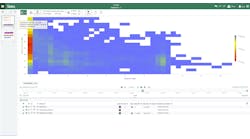Once when I was young, helping put groceries away, I put a cold thing in the refrigerator, but that particular item should have been put in the freezer. Days later my parents discovered it, thawed and ruined. I didn’t know that it had to be frozen. Dad said, “If you don’t know, ask.”
Another time, I wore rubber-soled boots in the house, even after being told not to because they left black scuff-marks on the floor. When I saw the scuff-marks and realized I’d be reprimanded, I decided to wipe them up. Paint thinner, I'd learned, was a great solvent; and as expected, it made the wipe-up easy, and I could quickly get back outside to play, proud of my cleverness and solution. However, the paint thinner dissolved the floor finish. Dad said, “If you don’t know, ask.”
But, I didn't know that I didn't know. If I didn’t know that I didn’t know, what reason would I have to ask?
Later, as a father myself, I was sweeping the kitchen floor with a broom, and my four-year-old son wanted to help. Not even half as tall as the broom handle, “Me do it,” he said. I gave him the broom, so that he could explore the magic of organizing dust. He took the broom where he could hold it, just above the bristles; and pulled it across the dust pile, spreading dirt, not combining it. Then he figured, pushing the dust might be the solution, and rearranged the broom to push, which scattered particles everywhere. While enjoying his exploration, what I mostly saw was the loose end of the broom handle flying around, banging things in the kitchen, trying its best to accidentally knock things off the counter and shelves.
There are two ends to every stick. When a novice is focused on one end of the stick, the consequences at the other end are seeking to make an accident happen.
[pullquote]During 13 years in industry, I worked on eight wholly different projects. Not only different technical topics, but with the diverse contexts of process development, manufacturing, product development and human supervisors. I don’t think this less-than-two-years-per-assignment situation is unusual. Consider that it takes a year to begin to understand the technology and its context. What this means is that you spend a large portion of your career as a novice, not as an expert. As a novice you don’t know what you don’t know. As a novice you're not aware of the other end of the stick.
As a novice, you always need to be cautious, observant, self-critical, and seek awareness of the implications. Yet, you need to act, and act urgently with incomplete information. It's never as simple as it seems.
Beyond career, you'll be a novice in personal financial decisions, in raising children and spouse and self, in choices of where to live and what organizations to join, in planning for your long-term future and everything important. As you make decisions, continually seek the other end of the stick. Engage others to discover what you don’t know.
Unfortunately, education has misdirected your perspectives, and thereby undermines your success. Students are trained (taught and tested) on trivial problems. Teachers need to isolate concepts, so topics can be learned, and they test the student’s skill on easy-to-create and easy-to-grade problems. Accordingly, students are programmed to think the one end of the stick is the complete story. Further, students are selected and promoted on their individual, independent performance. Accordingly, once hired, they tend to want to act in isolation of both the application context, and others’ input and advice.
School dupes students into thinking there's one end to a stick; and that once you know something, you know it all. Don’t be snookered by your education. Continually seek the other end of the stick, and engage others to discover what you don’t know.
[sidebar id =1]




